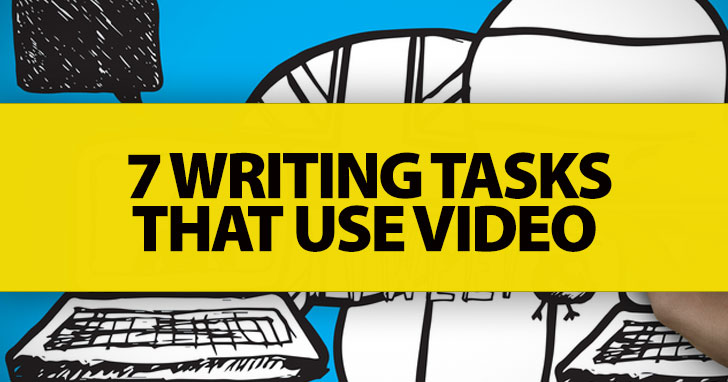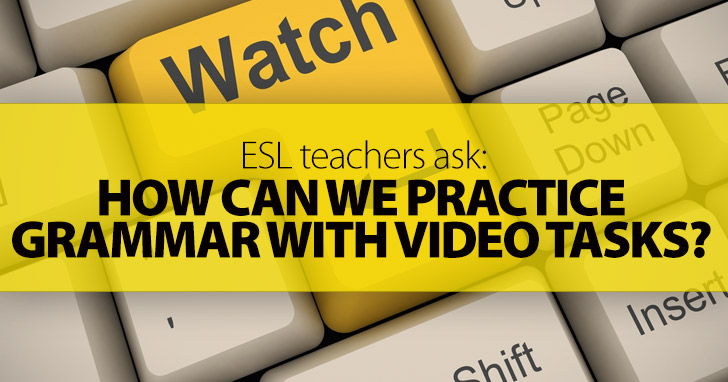7 Writing Tasks That Use Video


"The benefits of using video in the ESL classroom to boost listening comprehension are obvious. But I’m curious to know if we can also practice specific language points with videos. Can you give me some examples of great video tasks? *"
As ESL teachers, we place a great deal of emphasis on grammar. But grammar practice can be boring, repetitive and thoroughly demotivating if all we do is drill and use worksheets. We must find different ways to practice grammar, and videos give us plenty of opportunities to do just that. Videos also provide a welcome change of pace. So here are just a few examples of grammar you can practice through video tasks.

Grammar: Reported Speech
Reported Speech probably takes the cake as the most boring grammar point to teach. I mean, what’s the point in making a random direct statement and then having the student report it back immediately? It works for initial drilling, but at some point, students must understand that Reported Speech is very useful in certain real life scenarios, situations in which it is necessary to report what another person said. So play a short conversation or a snippet of a longer one (perhaps a scene from a sitcom) and have students report what each person said. You may also divide the class into two groups and have one group report the conversation from one point of view and the second group from the other.
Group A: The robber said he needed the money to feed his kids.
Group B: The shop clerk asked if he would take $40.
Give it a spin: Print a worksheet with a list of statements for each speaker. But make sure each of the statements has at least one inaccuracy, i.e., wrong date, hour, name, detail, etc… Students watch the exchange and then correct the inaccuracies with Reported Speech (He didn’t say he needed the money to buy a car. He said he needed it to pay the rent and feed his kids.)
Grammar: Simple Future Tense
Play a video but pause it before you give too much of the situation away. For example, play this video of Mr. Bean in jail but pause it just as he stands before the mirror. Have students predict what will happen next (Mr. Bean will start dancing in front of the mirror). Continue playing the video and see which predictions came true.
Give it a spin: Watch a longer video or movie, like Deep Impact, but watch it in segments. Ask students to make their predictions after each segment.
Grammar: Countable/Uncountable Nouns
Show a video that features a very cluttered office, messy classroom or open cabinet/refrigerator door. Freeze the image and have students describe what they see. They must use there is/there are, some/any, a lot of/a few/a little, as well as the right countable/uncountable nouns.
Give it a spin: Freeze the image and show it for 30 seconds. Then, cover the screen or turn off the TV/computer monitor. Students write down as many things as they remember, using the target grammar (There are a few papers on the floor). Put the image back on and compare. See which students remembered the most things correctly.
Grammar: Simple Past
Find a video where a character carries out a series of actions, like this classic Mr. Bean video. Use this worksheet on Mr. Bean’s Sandwich or create your own to have students practice the Simple Past. Now, this is something you can also do with several other verb tenses like the Simple Present or Present Continuous.
Give it a spin: Play the video with the sound off and have students tell you what the person is doing/did. They’ll have to think fast!
Grammar: Modals of probability
Play a video but cover the screen so students can only hear what’s going on. Based on what they hear, students use modals of probability to guess what’s happening (They could be in an office. One of the people might be the boss).
Give it a spin: Have students discuss what the characters could/should have done differently (Bob shouldn’t have turned off his alarm clock).
Grammar: Imperative Form
Find a video that illustrates someone doing something in a series of steps, like a recipe, or instructions for how to build or make something. Students watch the video once for comprehension. Then, they watch it again with the sound off and use the imperative form to write the steps in their own words.
Give it a spin: Print a worksheet with the steps in the wrong order. Students must watch the video to put them in the right order.
Yes, videos are great for listening comprehension, but don’t underestimate their value in helping you practice grammar. Each video offers a wealth of learning potential. You just have to know where to look and how to use them to your advantage.
* This question was sent in from a real ESL teacher, just like you! If you have a question you’d like to have answered, share it in the comments below. Or tweet your question to @busyteacher_org with the hashtag #ESLTeachersAsk. Your question might get picked and featured in an article!